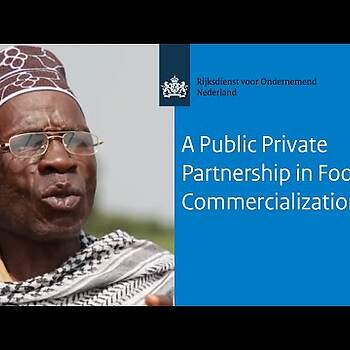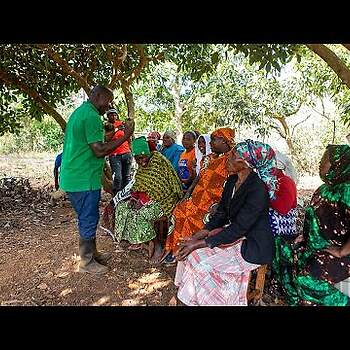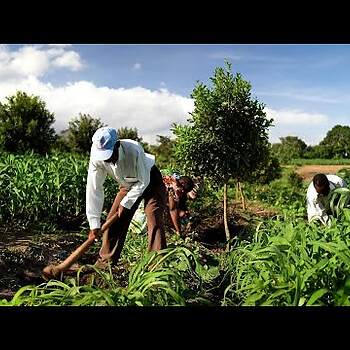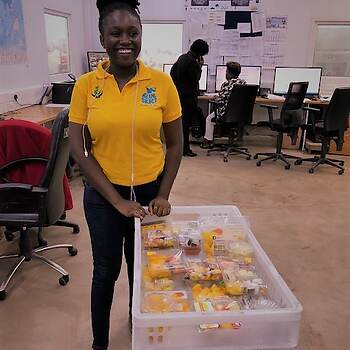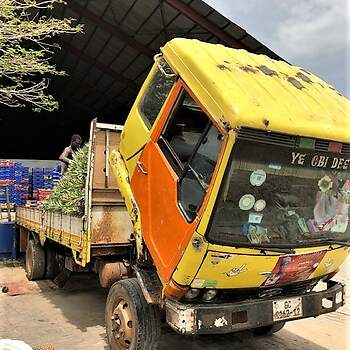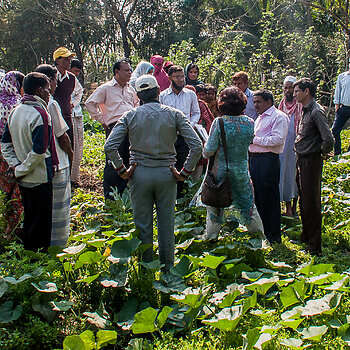Merger aid and trade: Ministry of Foreign Affairs
In 2013 development cooperation and facilitation of foreign trade were merged in one ministerial portfolio within the Dutch Ministry of Foreign Affairs, partly as a response to international thinking about gradually phasing out development cooperation in countries that had reached a certain level of economic prosperity and partly as a means to a perceived optimization of results through a stronger focus on comparative advantages of the involvement of Dutch private sector and knowledge institutions in agriculture and food security. Aid and trade were no longer seen as competing but as complementary efforts to reduce hunger and poverty and promote Dutch private sector interests. In some countries, agricultural attachés together with development cooperation sector specialists dealing with rural development and/or agriculture and food security, played an important role in drawing the Dutch private sector into development programs through public-private partnerships but also on the basis of commercial interests on the part of these companies.
Increased focus on food and nutrition security
In the wake of rising food prices in 2007 and 2008 and famine in the Horn of Africa, food security became a spearhead program in Dutch development cooperation in 2013. In the 2013 policy note, nutrition concerns were explicitly considered while maintaining a focus on the role of the private sector in conjunction with the government (creating an enabling business environment and public-private partnerships) and the role of Dutch knowledge institutions. The 2014 Letter to Parliament on food and nutrition security further emphasized nutrition and ecological sustainability in addition to improving the livelihoods of small-scale farmers. Support to agri-business SMEs was primarily through private sector instruments and public-private partnerships. Financial inclusion was considered a core issue to support farmers and SMEs.
Regional trade and the African Continental Free Trade Agreement
Trade was also considered to be an important factor in agricultural development and food security. In the Dutch support for regional market development in East and West Africa, special attention was given to agricultural trade and value chain development. In 2018 the AU African Continental Free Trade Agreement (AfCFTA) was signed by all but one of the countries in Africa[1]. The current thinking is that the AfCFTA, that became operational in 2021 in the countries that ratified the agreement, will become a game-changer, enabling local agricultural producers and agribusinesses in Africa to thrive, while at the same time reducing dependency on imported goods, including food and agricultural inputs. The European Union (EU) is actively engaging with the AU to move this agenda forward in complementarity with the Comprehensive Africa Agricultural Development Program (CAADP) also spearheaded by the African Union
Agriculture and food security increasingly vulnerable
Given the often severe negative environmental effects of (particularly large scale) agricultural investments, climate change and biodiversity loss in many LDCs the Dutch government (both NL MoFA and the LNV-component in the Ministry of Economic Affairs), environmental organizations like the Dutch branches of the World Wildlife Fund (WWF) and the International Union for Conservation of Nature (IUCN) as well as institutions like Wageningen University and the Initiative for Sustainable Trade (IDH) also started in this period to support multi-stakeholder landscape development processes that are mainly aimed at preventing massive deforestation, erosion, soil degradation, excessive water use leading to falling groundwater levels, water pollution, etc. and also to adapt to climate change effects and to conserve or restore damaged ecosystems. In the process, these programs often lead to changes in agricultural practices and they can play a role in preventing conflicts around (access to) natural resources. The IDH Landscape program works with (mainly large) companies whereas Dutch environmental organizations usually work from a nature conservation angle but often also engage with companies engaged in agriculture. In all landscape development programs spatial planning is a major component and, in several areas, there is also a focus on landscape restoration.
Collaboration between ministries at country level
LNV was merged into the Ministry of Economic Affairs which became the Ministry of Economic Affairs, Agriculture and Innovation, reflecting the role of agriculture in the Dutch economy. Within this ministry the Directorate of Development Cooperation was geared towards efforts to promote international public goods and food security and was closely aligned with the departments for international public goods (IGG) and private sector development (DDE) in the Ministry of Foreign Affairs.
Embassies were primarily responsible for the formulation of country specific multi-annual plans (which included both centrally funded and delegated programs). Country programs were defined on the basis of country needs and priorities as well as key Dutch policy priorities. Efforts were directed towards those areas where Dutch interventions could make a difference and were complementarity with interventions by other donor agencies.
Agricultural attaches: expanding the network
In many countries Dutch line ministries assigned agricultural attaches to work together on the design and implementation of agricultural development policies and specific projects with involvement of Dutch ‘players’. Also the Dutch ministry LNV, responsible for Agriculture and Nature assigned agricultural counsellors/attaches at embassies where the bilateral relationship and cooperation in the field of agriculture was considered important. They were usually responsible for a wider geographic area than the country of posting. The attaches were in close contact with the Dutch agricultural sector, both private enterprises and public institutions as well as with the national agricultural sector to provide (mutual) access to markets or solve phyto sanitary and other problems.
Also in some development cooperation partner countries, agricultural attachés were assigned, in particular in countries or regions with good opportunities for involvement of the Dutch private sector through PPP’s, and also to advise Dutch embassies on food security and food safety policies and programs as well as national governments and inter-/supranational organizations on agriculture related matters. The agricultural attaches facilitated many (specific) agricultural trade missions to and from various countries. They also connected private businesses with Dutch subsidy instruments through the Netherlands Enterprise Agency (RVO), top sectors or other initiatives.
